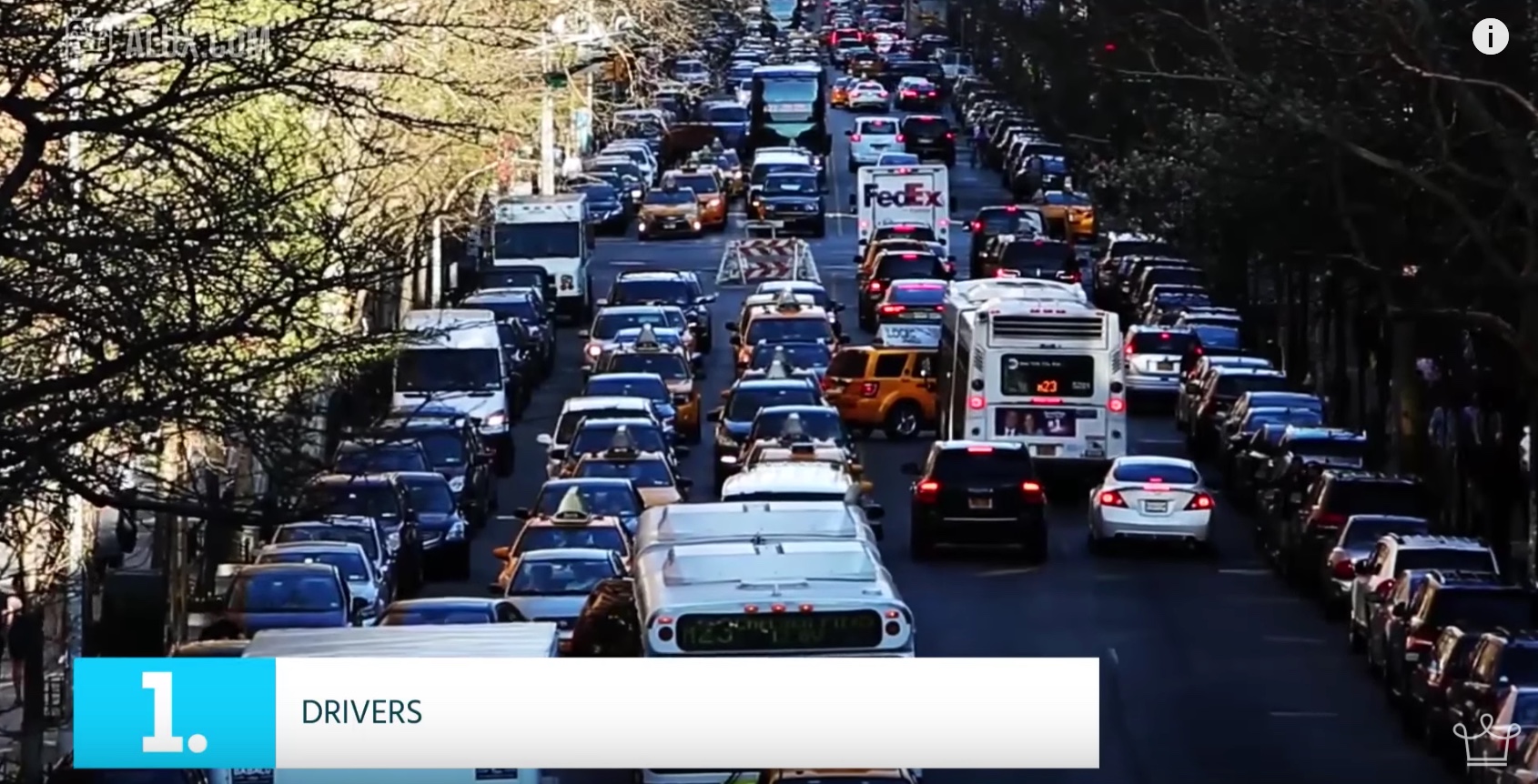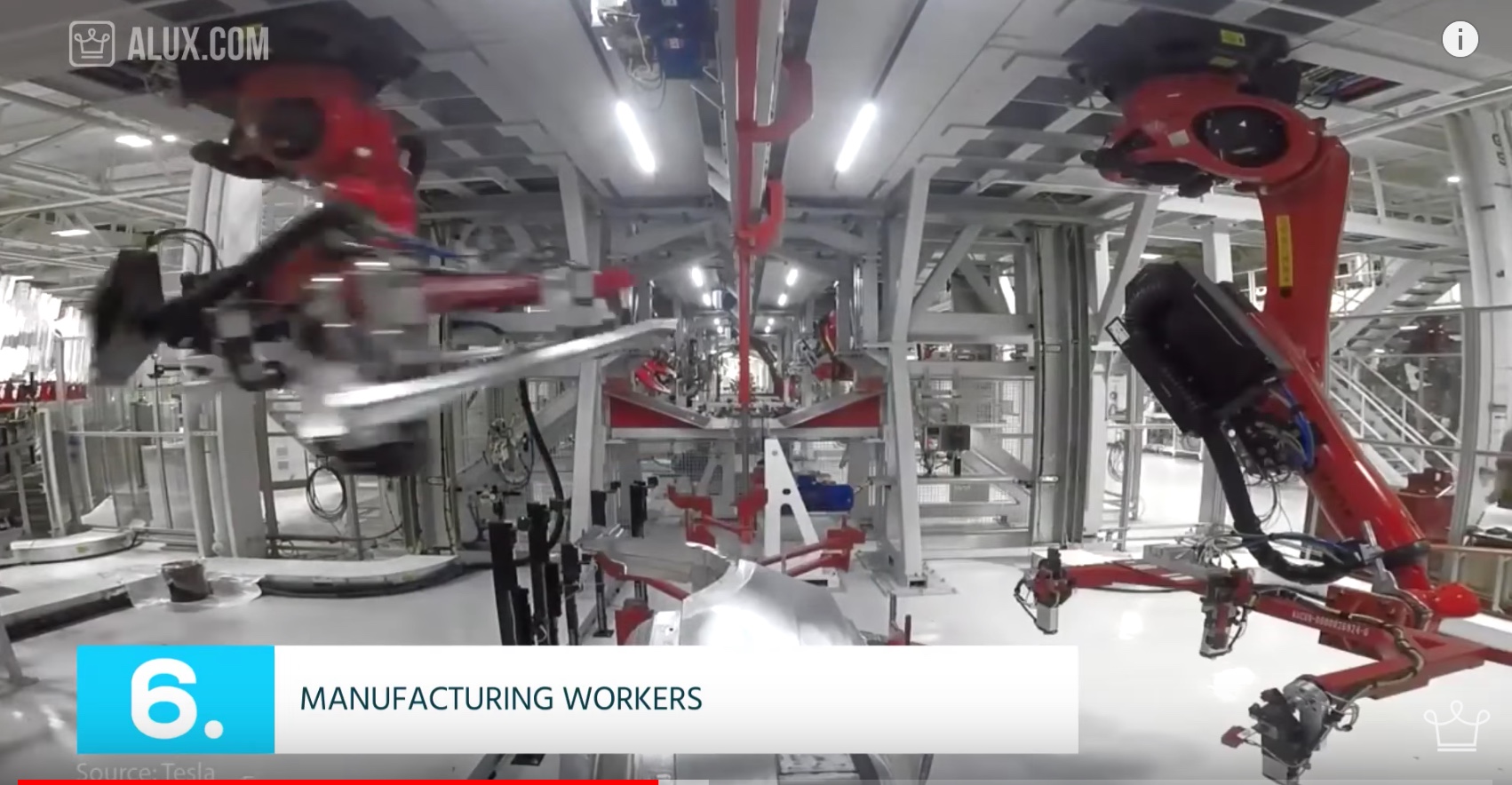
16 Jobs That Will Disappear In The Next 20 Years Due To Artificial Intelligence from Alux.Com (@aluxcom) should provide guidance to students and people already in the workforce. If you have one of these jobs, start preparing for something else. If you are still in school, prepare for something else. Watch the original Alux.Com video on YouTube. For each job, I have added my own thoughts and advice based on my daily viewing of Internet resources for this blog.
One study at Oxford found that 45% of all jobs will disappear in the next ten years.
- For the most part, it’s easy to extrapolate from where we are to where we are going as many of these job loss trends are well underway or available as prototypes. As time marches forward, machines and computer software will be able to do more and more and this isn’t new. Not only will jobs in the US disappear, but many of the jobs that have been sent offshore will return only to be done by machines and/or computers.

16 Jobs Not to Train for and to Start Retraining If You Are In One
- 1. Drivers – It looks like it won’t be long before cars and trucks drive themselves. Our 20 million drivers will have to reinvent themselves. There are already self-driving trucks in Nevada and self-driving Uber cars in Pittsburg. This should be a real boon for old people and it should save many lives. Perhaps when I get to the point where my daughter tries to take my car keys away I’ll have a self-driving car.
- 2. Farmers – Much of what needs to be done is rapidly being automated. Labor intensive jobs are already disappearing. This should reduce our reliance on immigrant labor. Already under 2% of employed people in the US work on farms. Farming also continues to become more hi-tech. On some dairy farms, for example, cows are already milking themselves. If you want to be a farmer, take as many science and engineering courses as you can. You can also expect to work for one of the ten companies that control almost all of the food we eat.
- 3. Printers and Publishers – This one is well on its way with the growth of Internet publishing. Few publishers have been able to establish a successful paywall in front of their online content. These jobs won’t totally disappear for a while as older people like me still like the experience of holding real books, magazines, and newspapers. There is no laptop screen as big as my physical New York Times.
- 4. Cashiers – Self-checkout stations are expanding already. At my Walmart, as of today, there are eight along with an equal number of checkouts staff by humans. I prefer self-checkout at grocery stores and places like Walmart as there is usually no waiting. I suspect that as soon as lines show up they will add more and have fewer humans. I’ve used them in restaurants as well and I like this experience. I don’t have to give my credit card to some server I don’t know who takes it someplace where I can’t see it. In the last year, my card was hacked twice in restaurants in New York City for this reason. Fast food restaurants now let you order and pay using your smartphone from the parking lot.
- 5. Travel Agents – I’ve been doing my own booking online for years. The last time I used a real agent was in 2002. Many of my retired friends sign up for tours where someone does all the planning and makes all the arrangements for at least a bus full or people. I prefer doing it myself as when you go on a tour bus or cruise ship you take the crowd with you.
- 6. Manufacturing Workers – Now machines build other machines with less human interaction every year. This is not new as car manufacturers have been using robots for decades. This is a slow and steady change unlike some of the others listed here. Many schools are letting students manufacture things with 3D printers. This is one more reason why all students should try to take a few programming courses.
- 7. Dispatchers – The role of the dispatcher is coordinate people in the field. Technology will soon do this better. You can already call your own cabs and pay with your smartphone. I think we will need people who can maintain and repair vehicles for some time. These jobs have already become more technical as the first thing they do is connect a computer to the vehicle’s computer.
- 8. Waiters and Bartenders – This trend has already begun. I’ve been to restaurants where once you are seated you use a tablet at the table to order and pay. We still need humans to do some of the food preparation, but there is no reason why a robot can’t serve the food someday soon.
- 9. Bank Tellers – ATMs have already cut the number of people doing this job. There are still many transactions that we need tellers for, but efficiency is making them more productive. At my bank, the tellers use a machine to count the money I get when I cash a check.
- 10. Military Pilots and Soldiers – The military is often the first to adopt new technology. Drones are more accurate and safer, at least for the person piloting the craft. We only have prototypes of robot soldiers at this point, but the idea of a robot soldier engaging bad guys in urban warfare has a lot of appeal. Check out this prototype soldier from Boston Dynamics. We also have robots that help clear IEDs and landmines. As terrorists adapt and evolve, we will need to do the same with increasingly advance technology.
- 11. Fast Food Workers – This falls in the same category with the waiters and bartenders. According to some thinking, the push for $15/hour pay has pushed automation to be adopted faster. Order taking and paying is easy to automate. The harder part of food preparation will take a bit longer, but it is already underway. The remaining humans will need to be more skilled to troubleshoot the entire process.
- 12. Telemarketer – This industry has been taken over by online ads. People like me that only have cell phones can block calls, which takes a big piece of the market off the table. Facebook, for example, can test the effectiveness of ads and target them to people who are more likely to respond. I don’t mind seeing this job go as it seems like a crappy job.
- 13. Accountants and Tax Preparers – Boring and repetitive jobs are ripe for takeover by machines. Most people have simple needs for tax preparation that can easily be met by software. Tax preparation software is already decades old. If you are an accountant or plan to be one, you better be good and expect to only get the tricky nonroutine work. Rich people and large corporations will still need tax preparation people, but they better be really top notch.
- 14. Stock Traders – Only 10% of stocks traded today are traded by humans. In this world, the bots always win. Most people will still want to talk to a financial advisor who needs to be very knowledgeable and constantly learning. The habits of constant learning and continuous improvement should serve workers well as they try to deal with the ever-changing nature of the job market.
- 15. Construction Workers – Technology is getting more efficient and fewer specialized workers will be needed at the job site. For example, watch Sam the Bricklaying Robot that can lay bricks better and three times as fast as the fastest human. Sam’s human supervisors will have to understand the entire job and not just be able to lay bricks. This trend probably started with the invention of the wheel or something like that. Automation has also dramatically cut the number of people needed to run mines and oil fields.
- 16. Movie Stars – Human actors are expensive and moody. Actors will just be generated by computers. The 3D animated movies like Toy Story and others already give us an idea of how movies can be made without actors. Next time you see one of these animated movies be sure to stay for the credits and read about the hundreds of jobs that take the place of a relatively small number of actors. The problem here is when the movie is done, all of those people have to look for their next job. There are a lot of jobs for non-starving artists who are willing to do what the boss wants as opposed to their own thing so don’t hesitate to develop some artistic skill.


Dr. Doug’s General Advice On Preparing For the Future
- We know that it is very difficult to know what kind of job you are going to be doing even a few years in the future. In the meantime, there are a few things that are clear as far as what you can do to prepare for whatever comes next no matter how old you are.
- 1) Whatever you do, get good at it. There will be less and less work for people who are mediocre.
- 2) Become a self-directed learner so you can acquire as much in the way of skill and knowledge as possible on your own. This can start as early as elementary school for some students. Tricky jobs require fast learners who can figure things out as they go. There are tools on the Internet that make learning much more available.
- 3) Work hard and learn something new and try to improve every day. The future is not likely to belong to the slackers, at least for a while. If we get to the point where machines are doing everything we have to get good at slacking.
- 4) Consider taking as many science, engineering, and programming courses as possible. In a future featuring more and more robots, you want to be designing, maintaining, or supervising them rather than being replaced by them. Even if you don’t want to get serious about programming, at least learn how to create and maintain an attractive website.
- 5) Creative people will always be in demand. Some might argue that creativity cannot be taught, but most educators believe that it can be facilitated. If you don’t give students open-ended problems and projects, they won’t be able to exercise their creative ability. Parents can do this too.
- 6) Artistic skills will be in demand. Everything you see on television, print media, and the Internet was created in part by artists. If you want to go to an art school, make sure it’s one where you will spend most of your time developing your artistic ability rather than taking a bunch of liberal arts courses. Try to take the AP versions in high school so you can avoid them in college. Also, pick a school in a big city where it will be easier to get high quality internships.
- 7) Develop your network. Most people get their jobs by way of word of mouth. In addition to working hard to become highly skilled and creative, make sure that as many people as possible in addition to family and friends know what you can do. Rather than a resumé, put samples of your best work, whatever it is, on your website.
Some TED Talks on the Topic
- Jobs of the Future and How We Can Prepare For Them, a TED Talk by Avinash Meetoo. @AvinashMeetoo As robots proliferate, the creative arts will thrive because people will have time on their hands and will be able to create things that entertain. In addition to the creative arts, there will be a high demand for jobs that call for computer science.
- AI and the Future of Work a TED Talk by Volker Hirsch @vhirsch FoxCon in China is replacing 60,000 workers with robots. This means it’s cheaper to use robots than it is to pay someone $5 a day. Keep in mind that we have had industrial robots for decades. Drones are already delivering pizzas in New Zealand. Large legal firms are using AI to do legal work. Automation will take every job that it can take. Anything that has repetition machines can probably do better. If you are an account or radiologist you should consider retraining. Hoping that change won’t happen is a bad idea.
- How the Future of Work is Not Jobs a TED Talk by Rudy Karsan @RudyKarsan tells us that people are already creating work and that entrepreneurism will increase in the future. He also makes a pitch for universal minimum income.
DrDougGreen.com If you like the summary, buy the book





